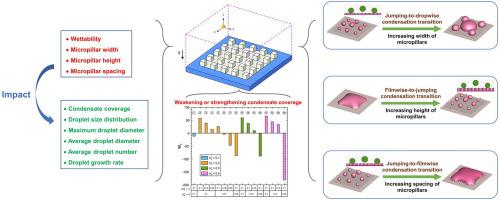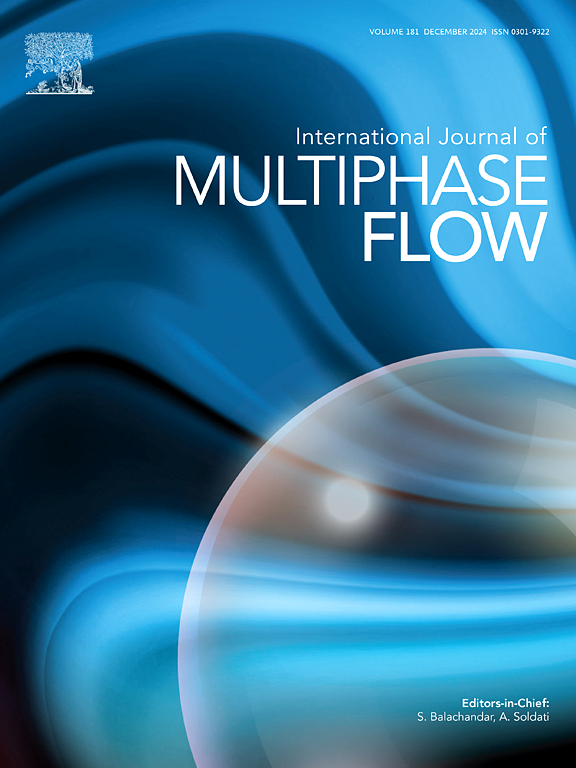Dropwise condensation on subcooled micropillar surfaces with 3D lattice Boltzmann method
IF 3.6
2区 工程技术
Q1 MECHANICS
International Journal of Multiphase Flow
Pub Date : 2024-10-09
DOI:10.1016/j.ijmultiphaseflow.2024.105015
引用次数: 0
Abstract
In this investigation, an alternative geometric formula is proposed to address the force between fluid nodes and fluid ghost nodes, with the aid of which the contact angles can be varied in the range of 48.3°∼131.9°. This formula is applied to the three-dimensional double-distributed thermal lattice Boltzmann method being proved to be accurate and reliable by single droplet condensation. The effects brought by varying micropillar size on the kinetic properties of condensed droplets, including nucleation, growth, coalescence and jumping, are investigated in detail. The results show that the droplet wetting state tends to be the suspended Cassie state as the width and spacing of the micropillars are decreased, and the condensed droplets can merge and jump off the micropillar surface. In the meantime, the average droplet number increases, the average diameter and the diameter of dominant droplets decrease, thus reducing the condensate coverage. When the micropillar spacing is small, increasing the micropillar height results in the condensed droplet state being changed from Wenzel to Cassie state, and the percentage of small droplets also increases. Instead, when the micropillar spacing is large, by increasing micropillar height, droplets can nucleate in the middle of micropillars, and the percentage of large droplets is improved due to increased heat transfer area. In this study, the surface self-cleaning capability is strongest with the combination of dimensionless pillar height 0.4, spacing 0.1 and width 0.1, which reduces the condensate coverage by 66 % compared to its plain competitor.

用三维晶格-玻尔兹曼方法研究过冷微柱表面的液滴冷凝问题
在这项研究中,针对流体节点和流体幽灵节点之间的作用力提出了另一种几何公式,借助该公式,接触角可在 48.3°∼131.9° 范围内变化。该公式应用于三维双分布热晶格玻尔兹曼法,并通过单液滴凝结证明了其准确性和可靠性。详细研究了不同微柱尺寸对凝结液滴的成核、生长、凝聚和跃迁等动力学特性的影响。结果表明,随着微柱宽度和间距的减小,液滴润湿状态趋向于悬浮卡西状态,凝结的液滴可以从微柱表面合并和跳跃。同时,平均液滴数增加,平均直径和主要液滴的直径减小,从而降低了冷凝液的覆盖率。当微柱间距较小时,增加微柱高度会导致冷凝液滴状态从温泽尔状态转变为卡西状态,小液滴的比例也会增加。相反,当微柱间距较大时,通过增加微柱高度,液滴可以在微柱中间成核,由于增加了传热面积,大液滴的比例也会提高。在这项研究中,无量纲微柱高度为 0.4、间距为 0.1、宽度为 0.1 的组合具有最强的表面自清洁能力,与普通微柱相比,冷凝水覆盖率降低了 66%。
本文章由计算机程序翻译,如有差异,请以英文原文为准。
求助全文
约1分钟内获得全文
求助全文
来源期刊
CiteScore
7.30
自引率
10.50%
发文量
244
审稿时长
4 months
期刊介绍:
The International Journal of Multiphase Flow publishes analytical, numerical and experimental articles of lasting interest. The scope of the journal includes all aspects of mass, momentum and energy exchange phenomena among different phases such as occur in disperse flows, gas–liquid and liquid–liquid flows, flows in porous media, boiling, granular flows and others.
The journal publishes full papers, brief communications and conference announcements.

 求助内容:
求助内容: 应助结果提醒方式:
应助结果提醒方式:


